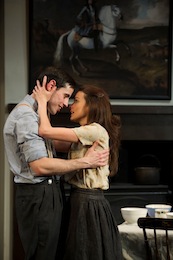“Fenian”. “Taig”. “Papish”. They’re terms spat indiscriminately across the footlights by John Rainey, Protestant paterfamilias and central character of St. John Ervine’s Mixed Marriage, and they elicit sporadic bursts of laughter from the Lyric Theatre audience. The laughter is probably nervous as much as anything, for this is Belfast 2013, and the recent waves of flag-fuelled ugliness and violence in the city make Ervine’s examination of sectarian conflict from a century earlier (the play premiered at the Abbey Theatre in 1911) seem painfully familiar.
The storyline is relatively simple. Rainey, a proud Orangeman, is persuaded by Michael O’Hara, a Catholic co-worker, to use his powers of rhetoric to unite striking workers against factory owners bent on fomenting religious tensions among the strikers. Rainey does so happily, until his elder son Hugh announces his intention to marry a Catholic girl, Nora Murray. He then angrily withdraws his support for the strike, feeling he has been hoodwinked and outmanoeuvered by a combination of Hugh and O’Hara. The rioting escalates, and Rainey unbendingly refuses to intervene, with devastating consequences.
It’s a scenario charged with dramatic potential, familial loyalties clashing brutally with political and religious imperatives. For much of the time, sadly, Ervine’s writing falls disappointingly short of doing the raw material justice. John Rainey suffers particularly from the piecemeal stultification of characters and their motivations. One moment he’s an affable family man and willing cross-community orator, the next a domineeringly inflexible domestic bully and detester of all things Catholic. How did that happen, and so quickly? Ervine gives little indication: Rainey’s bigotry is so deep-seated that it seems beyond verbal articulation, and we merely guess at the emotional tumult which is presumably going on within him.
Marty Maguire battles heroically to give a human face to Rainey, intelligently probing what may possibly be the character’s deeper feelings, attempting to render comprehensible his apparently insensate attitude to the havoc he is wreaking in his own family. It’s a losing battle, unfortunately – Ervine’s contextualisation of Rainey in his historical place and period is virtually non-existent, the bluntly repetitious anti-Popery goes uninterrogated, and it’s difficult to have any abiding sympathy with the character.
With Mrs Rainey, it’s different. She is, predictably enough, the voice of reason in the play, a tolerantly pragmatic presence dispensing pearls of common wisdom while flipping soda farls upon a griddle, darning socks, or helping her menfolk take their boots off in the evening. Ervine’s writing for Mrs Rainey is more expansive and nuanced than it is for her husband, and enables the excellent Katie Tumelty to create a warm, believably human presence in a play stymied by Ervine’s rigidly schematic shackles.
Tumelty is specially effective in the scene where she’s spooling wool with Hugh’s Catholic girlfriend Nora (Karen Hassan): there’s a tenderness and understanding in her interactions with the younger woman which contrast graphically with the attitudes of her terminally bull-necked, unyielding husband. There’s sterling support work from Darren Franklin as the put-upon younger son Tom, Brian Markey as the love-struck, conflicted elder brother Hugh, and Gerard Jordan as the earnest Sinn Féin sympathiser Michael O’Hara.
 The entire action unravels in the appropriately claustrophobic setting of the Raineys’ grey-wash kitchen, dominated in Alyson Cummins’s abstemious design by a gently glowing stove and a large painting of William, Prince of Orange, mounted triumphantly on a white charger. Lighting is unobtrusively functional, except for an odd, shadowy interlude between Acts Three and Four where the cast walk backwards round the stage, performing a variety of scene-shifting activities. This presumably has symbolic significance; of what type exactly it isn’t certain.
The entire action unravels in the appropriately claustrophobic setting of the Raineys’ grey-wash kitchen, dominated in Alyson Cummins’s abstemious design by a gently glowing stove and a large painting of William, Prince of Orange, mounted triumphantly on a white charger. Lighting is unobtrusively functional, except for an odd, shadowy interlude between Acts Three and Four where the cast walk backwards round the stage, performing a variety of scene-shifting activities. This presumably has symbolic significance; of what type exactly it isn’t certain.
Mixed Marriage ends in scenes of mounting tension and trepidation, the frightening crack of rifles ringing loudly in the auditorium, and a dénouement mingling melodramatic overkill (literally) on Ervine’s part with a forensic ratcheting up of the emotional tension by director Jimmy Fay, whose pacing of the action is consistently sure-footed throughout the evening. The blood-spattered conclusion is properly shocking, leaving several of the actors visibly drained at curtain-time.
Mixed Marriage is the first in a series of four projected stagings of plays inspired by Belfast at the Lyric, celebrating the four hundredth anniversary of the city’s original charter. In that context St. John Ervine’s play was worth reviving: it gives an interesting snapshot of working-class Protestant mentalities in the early twentieth century, and there are intriguing parallels in Ervine’s writing with German expressionist drama of the period.
Good as the Lyric’s production is, however, it won’t lead to a major reassessment of Ervine’s reputation, which is deservedly waning. His pen is too often glibly wielded, his characters too frequently close to ciphers, his grasp of the deep complexities and subtleties underlying sectarian behaviour unhelpfully crude and two-dimensional. O’Casey began examining similar thematic material a mere decade later: he did it so much better.
Terry Blain is an arts journalist and cultural commentator, contributing regularly to BBC Music Magazine, Opera Britannia, Culture Northern Ireland and other publications.